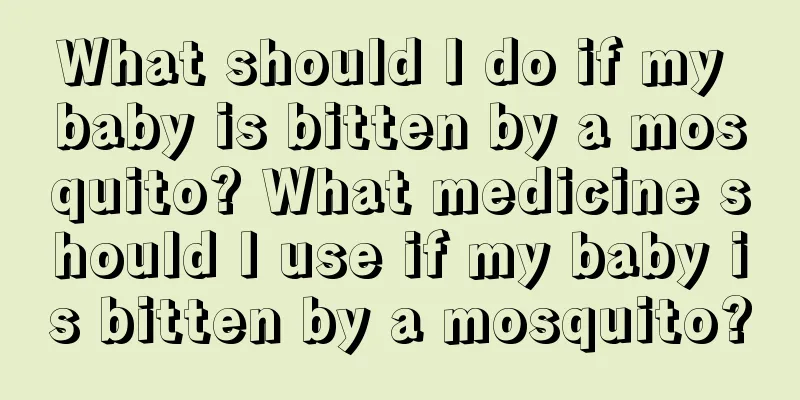What are the symptoms of neonatal colic? What does neonatal colic look like?

|
Newborns cannot express themselves verbally soon after birth, and can only cry if they have physical problems. Parents should carefully observe their baby's behavior. So what are the symptoms of neonatal colic? What does neonatal colic look like? Causes of neonatal colic1. The little belly inhales too much air. When babies are hungry or too full, they will cry, and the crying action may cause the baby to inhale too much air, so that their little belly bulges. This feeling is extremely uncomfortable, so the babies start to cry. 2. Indigestion. The baby's stomach is still quite weak. The digestive enzymes and digestive juices used to break down food in the digestive tract are still insufficient, especially amylase. The breast milk or formula milk that the baby drinks every day are relatively difficult to digest. After all, the protein is very high. At this time, the baby may experience intestinal colic because of indigestion. 3. Psychological factors. Babies also have their own little emotions, such as anxiety, anger or tension. In fact, they are still emotionally unstable little guys. When the little emotions have nowhere to vent, the baby is prone to colic. 4. Personal physique is sensitive. Some babies will not feel uncomfortable even if they are bloated, but some babies are more sensitive, so the reaction will be stronger, resulting in colic. Symptoms of neonatal colic1. A common symptom of neonatal colic is that the baby will suddenly scream, sometimes crying at the top of his lungs, and even crying until his face turns red and his neck becomes thick, but he still refuses to stop. 2. Some newborns may have shaking heads, arched bodies, and slightly rapid breathing. At the same time, their abdomens may be swollen, their palms may be clenched into fists, and their feet may be stretched or bent. Mothers may feel cold when they touch their baby's hands and feet. 3. The above symptoms can last from tens of minutes to hours. No matter how the mother shakes, holds or coaxes the baby, it is often not very effective. The baby will not stop until he cries out of exhaustion. Sometimes the baby will get better after defecating or farting. This disease can occur at any time, but it most often occurs in the evening or evening, and almost every day it occurs at a fixed time. What to do if your newborn has colic1. Massage the abdomen. The baby keeps crying, and the mothers are heartbroken. At this time, it is recommended that mothers massage the baby's abdomen, or use a lubricated rectal thermometer to repeatedly stimulate the baby's anus to help the little ones expel gas. 2. Breastfeed as much as possible. Studies have shown that babies who drink breast milk are less likely to suffer from colic. In addition, breastfeeding mothers should also pay attention to not eating spicy and irritating foods, not drinking caffeinated drinks, and eating less raw and cold foods, otherwise the baby may be unwilling to drink milk. 3. Comfort the baby. If you take good care of the baby, he will be a quiet and handsome man. Moms can wrap the baby with a bath towel, but not too tight. You can also massage the baby's back, but be gentle! 4. Create a quiet environment. If the baby's room is too noisy, it may cause dissatisfaction in the baby. Remember to give them "private space" and let the baby rest in a quiet environment. |
Recommend
How to deal with breast milk jaundice and how long it will take to go away
Many new mothers see some small spots on the face...
How to prevent children from having ADHD and what are the symptoms
ADHD seriously affects children's physical an...
How is Junlebao milk powder? Which series of Junlebao milk powder is good?
As we all know, there are many brands of milk pow...
Why do infants roll their eyes when they sleep? What are the precautions for babies to learn to swim?
Some babies roll their eyes when they sleep, whic...
What tests should be done for children's snoring? Do children's snoring need surgical treatment?
Snoring in children is a relatively common phenom...
What are the dangers of sinusitis in children? How to treat sinusitis in children effectively?
Sinusitis is often a respiratory tract infection ...
How to feed a baby after one year old? Is it good for the baby to drink milk?
Is it necessary for babies over one year old to d...
Can I still get pregnant if I have ovulation bleeding?
When it comes to ovulation bleeding, everyone may...
My period is almost one month late, am I pregnant?
My period has been delayed for almost a month. I ...
How long after giving birth can I practice Pilates? Pay attention to the intensity of exercise
Generally speaking, if you give birth naturally, ...
How to relieve toothache during breastfeeding?
Breastfeeding mothers have to be careful about wh...
What does internal inspection check? How is it conducted?
Many mothers who have given birth know that befor...
What brand of toothbrush is good for pregnant women? Things to pay attention to during the first three months of pregnancy
In order to better care for themselves and the ba...
Can you eat overnight watermelon? What are the dangers of eating overnight watermelon?
What are the dangers of eating overnight watermel...
Can the prepared milk powder be boiled? Things to pay attention to when preparing milk powder for babies
Making milk powder for babies is not an easy task...









